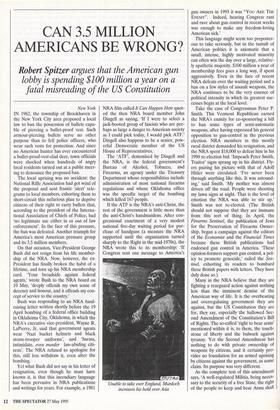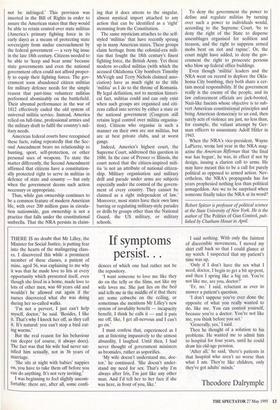CAN 3.5 MILLION AMERICANS BE WRONG?
Robert Spitzer argues that the American gun
lobby is spending $100 million a year on a fatal misreading of the US Constitution
New York IN 1982, the township of Brookhaven in the New York City area proposed a local law to ban the possession of bullets capa- ble of piercing a bullet-proof vest. Such armour-piercing bullets serve no other purpose than to fell police officers, who wear such vests for protection. And since no American hunter has ever encountered a bullet-proof-vest-clad deer, town officials were shocked when hundreds of angry local residents turned out at a public meet- ing to denounce the proposed ban.
The local uprising was no accident: the National Rifle Association had got wind of the proposal and sent frantic `alert' tele- grams to local members, exhorting them to short-circuit this nefarious plan to deprive citizens of their right to carry bullets that, according to the president of the Interna- tional Association of Chiefs of Police, had `no legitimate use either in or out of law enforcement'. In the face of this pressure, the ban was defeated. Another triumph for America's most American pressure group and its 3.5 million members.
On that occasion, Vice-President George Bush did not resign from his life member- ship of the NRA. Now, however, the ex- President has finally broken the habit of a lifetime, and torn up his NRA membership card. 'Your broadside against federal agents,' wrote Bush to the NRA board on 10 May, 'deeply offends my own sense of decency and honour, and it offends my con- cept of service to the country.'
Bush was responding to an NRA fund- raising letter written shortly before the 19 April bombing of a federal office building in Oklahoma City, Oklahoma, in which the NRA's executive vice-president, Wayne R. LaPierre, Jr, said that government agents wear 'Nazi bucket helmets and black storm-trooper uniforms', and 'harass, intimidate, even murder law-abiding citi- zens'. The NRA refused to apologise for this, still less withdraw it, even after the bombing.
Yet what Bush did not say in his letter of resignation, even though he must have known it, is that this incendiary language has been pervasive in NRA publications and writings for years. For example, a 1981 NRA film called It Can Happen Here quot- ed the then NRA board member John Dingell as saying, 'If I were to select a jack-booted group of fascists who are per- haps as large a danger to American society as I could pick today, I would pick ATF.' Dingell also happens to be a senior, pow- erful Democratic member of the US House of Representatives.
The `ATF', demonised by Dingell and the NRA, is the federal government's Bureau of Alcohol, Tobacco, and Firearms, an agency under the Treasury Department whose responsibilities include administration of most national firearms regulations and whose Oklahoma office was the specific target of the bombing which killed 167 people.
If the ATF is the NRA's anti-Christ, the rest of the government is little more than the anti-Christ's handmaidens. After con- gressional enactment of a very modest national five-day waiting period for pur- chase of handguns (a measure the NRA supported until the organisation turned sharply to the Right in the mid-1970s), the NRA wrote this to its membership: 'If Congress sent one message to America's Unable to take over England, Murdoch increases his hold over Asia gun owners in 1993 it was "You ARE THE ENEMY". Indeed, hearing Congress rant and rave about gun control in recent weeks was enough to make any freedom-loving American sick.'
This language might seem too preposter- ous to take seriously, but in the tumult of American politics it is axiomatic that a small, intense, highly motivated minority can often win the day over a large, relative- ly apathetic majority. $100 million a year of membership fees goes a long way, if spent aggressively. Even in the face of recent NRA defeats over the waiting period and a ban on a few styles of assault weapons, the NRA continues to be the very essence of political intensity in which its greatest suc- cesses begin at the local level.
Take the case of Congressman Peter P. Smith. This Vermont Republican earned the NRA's enmity for co-sponsoring a bill to ban some types of semi-automatic weapons, after having expressed his general opposition to gun-control in the previous election. NRA members in this mostly rural district demanded his resignation, and the NRA spent $18,000 to defeat him in his 1990 re-election bid. 'Impeach Peter Smith, Traitor' signs sprang up in his district. Fly- ers pairing his picture with that of Adolf Hitler were circulated. 'I've never been through anything like this. It was astound- ing,' said Smith. 'My mother was almost driven off the road. People were shooting my lawn signs at night. That is the level of emotion the NRA was able to stir up.' Smith was not re-elected. (The British should not suppose that they are immune from this sort of thing. In April, the Firearms Sentinel, the publication of Jews for the Preservation of Firearms Owner- ship, began a campaign against the editors of the Economist and the Financial Times because these British publications had endorsed gun control in America. `These opinion-formers support gun control, a pol- icy to promote genocide,' railed the Sen- tinel, exhorting its readers to bombard these British papers with letters. They have duly done so.) Many in the NRA believe that they are fighting a rearguard action against nothing less than the imminent demise of the American way of life. It is the overbearing and overregulating government they are against, but the US Constitution they are for, they say, especially the hallowed Sec- ond Amendment of the Constitution's Bill of Rights. The so-called `right to bear arms' mentioned within it is, to them, the touch- stone of liberty and the bulwark against tyranny. Yet the Second Amendment has nothing to do with private ownership of weapons by citizens, and it certainly pro- vides no foundation for an armed uprising by citizens against the government, as some claim. Its purpose was very different. As the complete text of this amendment says, 'A well-regulated Militia, being neces- sary to the security of a free State, the right of the people to keep and bear Arms shall not be infringed.' This provision was inserted in the Bill of Rights in order to assure the American states that they would be able to retain control over state militias (America's primary fighting force in its early days) as a means of protecting state sovereignty from undue encroachment by the federal government — a very big issue in the late 18th century. Citizens needed to be able to 'keep and bear arms' because state governments and even the national government often could not afford proper- ly to equip their fighting forces. The gov- ernment soon abandoned citizen militias for military defence needs for the simple reason that part-time volunteer militias performed abominably on the battlefield. Their abysmal performance in the war of 1812 effectively ended the old system of universal militia service. Instead, America relied on full-time, professional armies and the military draft to fulfil the country's mil- itary needs.
American federal courts have recognised these facts, ruling repeatedly that the Sec- ond Amendment bears no relationship to hunting, sport, self-protection, or other personal uses of weapons. To state the matter differently, the Second Amendment affirmed that citizens have a constitution- ally protected right to serve in militias in defence of state and country — but only when the government deems such action necessary or appropriate.
Thus, while gun ownership continues to be a common feature of modern American life, with over 200 million guns in circula- tion nationwide, gun ownership is not a practice that falls under the constitutional umbrella. That the NRA persists in claim- ing that it does attests to the singular, almost mystical import attached to any action that can be identified as a 'right' stemming from the Constitution.
The same mysticism attaches to the self- styled 'militias' that have recently sprung up in many American states. These groups claim heritage from the colonial-era mili- tias that fought the 18th century's finest fighting force, the British Army. Yet these modern so-called militias (with which the accused Oklahoma City bombers Timothy McVeigh and Terry Nichols claimed asso- ciation) have as much right to the title `militia' as I do to the throne of Romania. By legal definition, not to mention histori- cal fact, militias could and can only exist when such groups are organised and citi- zens called into service by either a state or the national government (Congress still retains legal control over militia organisa- tion). Citizens who organise in such a manner on their own are not militias, but are at best private clubs, and at worst gangs.
Indeed, America's highest court, the Supreme Court, addressed this question in 1886. In the case of Presser vs Illinois, the court noted that the citizen-inspired mili- tia 'is not an attribute of national citizen- ship. Military organisation and military drill and parade under arms are subjects especially under the control of the govern- ment of every country. They cannot be claimed as a right independent of law.' Moreover, most states have their own laws barring or regulating military-style parades or drills by groups other than the National Guard, the US military, or military schools. To deny the government the power to define and regulate militias by turning over such a power to individuals would, according to the Supreme Court, 'be to deny the right of the State to disperse assemblages organised for sedition and treason, and the right to suppress armed mobs bent on riot and rapine'. Or, the court might have added, to deny the gov- ernment the right to prosecute persons who blow up federal office buildings.
Even though 'militia' leaders and the NRA went on record to deplore the Okla- homa City bombing, they both share a cer- tain moral responsibility. If the government really is the enemy of the people, and its law enforcement officials are jack-booted, Nazi-like fascists whose objective is to sub- vert American constitutional principles and bring American democracy to an end, then surely acts of violence are just, no less than, for example, the valiant attempt by Ger- man officers to assassinate Adolf Hitler in 1943.
When the NRA's vice-president, Wayne LaPierre, wrote last year in the NRA mag- azine the American Rifleman that 'the final war has begun', he was, in effect if not by design, issuing a clarion call to arms. He may have meant this to be a call for purely political as opposed to armed action. Nev- ertheless, the NRA's propaganda has for years prophesied nothing less than political armageddon. Are we to be surprised when someone finally takes the NRA at its word?
Robert Spitzer is professor of political science at the State University of New York. He is the author of The Politics of Gun Control, pub- lished by Chatham House in April.



































































 Previous page
Previous page